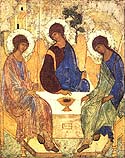There are poor people; there are rich people, and everything in between. We, all of us, want and hunger for something. Sometimes even unbelievably, in our own communities regardless of size and resources, it is for food. And with food come feelings of comfort, stability, strength, satisfaction, health, delight, memory, replenishment and rest. This dilemma of physical and emotional hunger is among us, has been with us, and will likely remain in humankind until the end of the world.

“For the poor will never cease in the land; therefore I command you, saying, ‘You shall freely open your hand to your brother, to your needy and poor in your land.’ (Deuteronomy 15:11)

In the New Testament, in each of the four gospels, there is reference to the poor and Christ’s relationship to them. The famous line: “For you always have the poor with you, but you will not always have me,” appears in some form in Matthew (26:11) Mark (14:7) and John (12:8), and in the Gospel of Luke we see many examples of where the tension between the rich and the poor is inverted so that the marginalized and the unimportant - those who hunger and thirst – are precisely those whom the Lord seeks. Jesus Christ, in word and deed, taught how important it is to consider the poor.
In an age of plenty, in a highly developed country as our own, there are still problems surrounding access to good, affordable food. I would go on to say that hunger and homelessness are inextricably tied. Furthermore, homelessness – the instability and inconsistency of basic housing, can be tied to any number of social problems. It very often means, what are we going to eat? Can I have a shower? Where will I do my homework? Are my clothes clean for the coming day? What if I get sick? Where can I play or hang out? Not knowing where you’re going to sleep on any given night, or knowing that where you’re sleeping is temporary and not your own bed night after night, is most especially burdensome for children and adolescents, school aged kids.

So what does this all really mean to us? If there will always be poor people what can we do about it? How can we solve the tension between poverty and wealth when the causes seem pretty big and complicated? And pretty ingrained in society? We start by simply seeing, recognizing, and accepting the poor and from that point not turning back.
I will give you two principles to consider, a “never” and an “always,” to turn over in your mind and to keep in your heart for reflection:
Never, ever, judge. The causes of homelessness and hunger can be complicated and are completely out of the control of the kids in a family. Never judge. Accept that you can’t know or perhaps even understand what people in this reduced and impoverished state must deal with. Being poor is stressful - a relentless balancing act of getting to the next day, or week, or the next month. To judge, especially if you confuse judging with “figuring out the problem” doesn’t help the person suffering in this state, and it is spiritually unprofitable for you.
Always, without hesitation, do something. The world and all that is in it is ours to consider. Open your eyes my friends to this knowledge and do not turn back from the opportunity, that is any opportunity, to do something. One thing, or maybe lots of things. May I suggest that you do not seek to “make a difference.” Let your actions no matter how simple or humble be the difference. Collect some cans of food, serve a meal to the hungry, and pray for the poor and needy; become a social worker or a policy expert on social issues, or run for public office; whether you are an electrician, or a daycare teacher, an insurance salesman, banker, barista, or barber , worker bee or a dreamer - give, offer, donate, gather, feed, work, volunteer, and again, pray. Once, twice, countless times, whatever you can do. Take the opportunity. You don’t have to save the world; you simply have to be prepared to be in this world fully, and with love. It is what Christ asks of us all.

Vera Proctor is the director of FOCUS Minnesota, an Orthodox charitable non profit providing basic-needs assistance to homeless and low income individuals and families.
